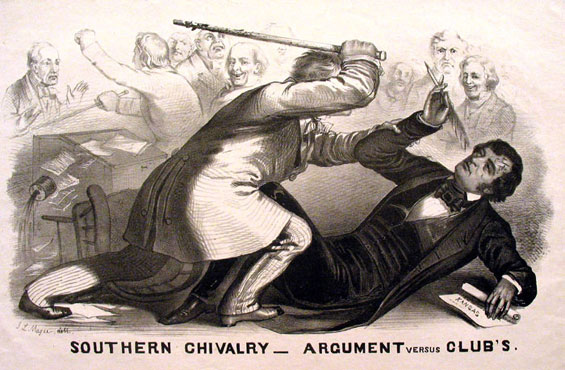The Caning of Charles Sumner occurred after Congressman Charles Sumner delivered a fiery speech titled "The Crime Against Kansas" that criticized slaveholders and the institution of slavery. It was symbolic of the mood of the country, where civil discourse had become impractical and often led to physical altercations.

Jump to:
Caning of Charles Sumner: Prelude
In 1856, during the "Bleeding Kansas" crisis, Charles Sumner made a passionate speech that spoke out against the Kansas-Nebraska Act, which laid an argument for the admission of Kansas as a free state immediately. He went on to completely denounce slavery in the South.
After attacking the institution, Sumner turned his attention to Stephen Douglas and Andrew Butler, the authors of the Act.
Sumner's speech drew a negative response from many southern and northern congressmen. Many did not like how crude he was in his speech or how derogatory he was towards his fellow congressmen.
Caning of Charles Sumner: Attack
Two days after Sumner's speech, Brooks, along with his other congressmen, waited in the Senate chamber for everyone to leave. After everyone left, Brooks and his allies walked up to Sumner, who was writing at his desk and said, "Mr. Sumner, I have read your speech twice over carefully. It is a libel on South Carolina and Mr. Butler, who is a relative of mine."
In response, Charles Sumner began to get out of his seat but was met with a thick cane across his head. Brooks continued to swing at Sumner, and the shocked congressman lost his sight.
Sumner fell to the floor and was trapped under his bolted desk. He was able to squirm and get loose from the desk, but the entire time, he kept taking shots from Brooks' cane. He stumbled into the aisle with blood dripping from his head and eventually collapsed.
Congressman tried to help Sumner but was blocked by Brooks' buddies.
Brooks continued his pummeling of Sumner and was finally restrained by other Congressmen. He left the chamber quietly.
Sumner regained consciousness and received medical attention. He returned to his lodging, where he received additional medical attention.
Congressman Brooks was charged with assault
Caning of Charles Sumner: Aftermath
After everything had settled down, Sumner became a martyr in the North and Brooks a hero in the South.
The northern press argued that the South would not allow free speech and that anyone who disagreed with them would be facing violence.
The caning also symbolized how divided the nation was, and the rising tensions were beginning to become violent.
Related Pages
- The Crime Against Kansas Speech
- The History Junkie’s Guide to the Civil War
- The History Junkie’s Timeline of the Civil War
- The History Junkie’s Timeline of American History
- The History Junkie’s Guide to Colonial America
- The History Junkie’s Guide to the Revolutionary War
- Slavery during the American Revolution
